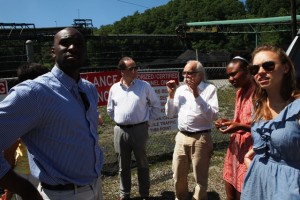They call it “Appalachian humanness,” the close-knit camaraderie and accepting attitude of people from the Appalachian region in eastern Kentucky.
Or as Natalie Nollan ’17 says, “People in Appalachia accept you from any walk of life and are able to articulate an aspect of humanness we haven’t experienced anywhere else.”

Osagie Afe ’16, Professor Michael Kelly, an Appalshop representative, Drew Davis ’17, and Natalie Nollan ’17 tour Whitesburg, Kentucky.
Nollan, a double major in anthropology & sociology and economics from Brighton, Michigan, traveled to Whitesburg, Kentucky, twice this summer with a group of faculty and students through the College’s Economic Empowerment & Global Learning Project (EEGLP). Teams of students and faculty from every academic division work hand in hand with residents to tackle economic issues locally, nationally, and internationally.
Economics faculty Anu Ghai, Gladstone “Fluney” Hutchinson, and Michael Kelly are advising the team of Nollan, policy studies major Osagie Afe ’16 (Bridgewater, New Jersey), economics major Drew Davis ’17 (Flourtown, Pennsylvania), and computer science major Manuel Tenorio ’17 (Waukegan, Illinois).
They are collaborating with Appalshop, a nonprofit arts and education center that produces original films, video, theater, music and spoken-word recordings, radio, photography, multimedia, and books to help preserve the rich culture of Appalachia.
The main goal is to find new ways for the organization to fund its mission while staying true to its values. The team made the first of two trips to Whitesburg at the beginning of the summer.
As Kelly explains, the team set out to map Appalshop’s assets and help it identify strengths. Learning that aspect of collaboration is the most essential skill students learn through EEGLP, says the professor. It is not about fixing a problem from the outside, but working with the client to develop existing strengths.
The trip was also about gaining a better understanding of the people of the region. Each student stayed with a local family.
Davis, who is also a track and field athlete, focused on defining Appalachian culture and searching for networking opportunities for Appalshop.
“The residents taught me about specific community values, such as pride and camaraderie,” she says. “Our experiences in Kentucky strengthened our separate interpretations of the analytical research we performed through the summer.”
Nollan researched what authentic/first voice is through Appalshop’s radio station. Tenorio created an analysis of the impact the project would have on the area and studied Appalshop’s core structure, and Afe studied and outlined ways in which their cultural traditions could be preserved for future generations.
The team developed its assessment and research while maintaining contact with Appalshop representatives via Skype and teleconferencing before returning to Whitesburg at the end of July to share its findings.
The next phase of the project will include working with Appalshop on a proposal for federal funding, a strategic plan for Whitesburg to become a cultural hub, and the start of a new business venture that applies the qualities of the region’s authentic voice and humanness to an artificial intelligence software to help school districts across America combat bullying.

1 Comment
Comments are closed.